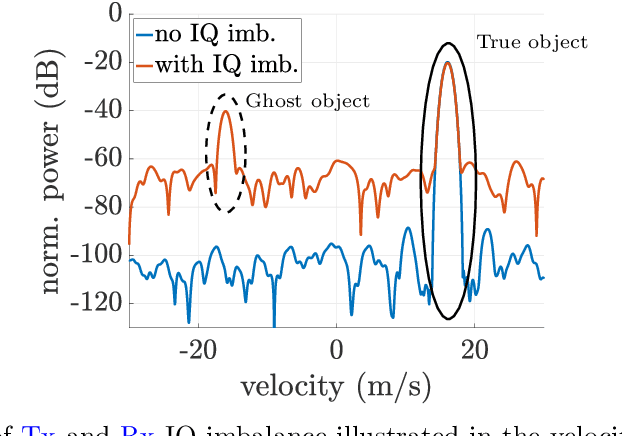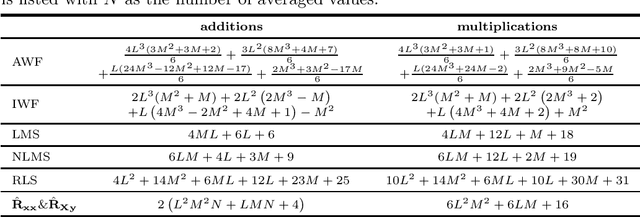Moritz Tockner
Tx and Rx IQ Imbalance Compensation for JCAS in 5G NR
Apr 14, 2025



Abstract:Beside traditional communications, joint communications and sensing (JCAS) is gaining increasing relevance as a key enabler for next-generation wireless systems. The ability to accurately transmit and receive data is the basis for high-speed communications and precise sensing, where a fundamental requirement is an accurate in-phase (I) and quadrature-phase (Q) modulation. For sensing, imperfections in IQ modulation lead to two critical issues in the range-Doppler-map (RDM) in form of an increased noise floor and the presence of ghost objects, degrading the accuracy and reliability of the information in the RDM. This paper presents a low-complex estimation and compensation method to mitigate the IQ imbalance effects. This is achieved by utilizing, amongst others, the leakage signal, which is the direct signal from the transmitter to the receiver path, and is typically the strongest signal component in the RDM. The parameters of the IQ imbalance suppression structure are estimated based on a mixed complex-/real-valued bilinear filter approach, that considers IQ imbalance in the transmitter and the receiver of the JCAS-capable user equipment (UE). The UE uses a 5G New Radio (NR)-compliant orthogonal frequency-division multiplexing (OFDM) waveform with the system configuration assumed to be predefined from the communication side. To assess the effectiveness of the proposed approach, simulations are conducted, illustrating the performance in the suppression of IQ imbalance introduced distortions in the RDM.
OFDM-based Waveforms for Joint Sensing and Communications Robust to Frequency Selective IQ Imbalance
Nov 16, 2023Abstract:Orthogonal frequency-division multiplexing (OFDM) is a promising waveform candidate for future joint sensing and communication systems. It is well known that the OFDM waveform is vulnerable to in-phase and quadrature-phase (IQ) imbalance, which increases the noise floor in a range-Doppler map (RDM). A state-of-the-art method for robustifying the OFDM waveform against IQ imbalance avoids an increased noise floor, but it generates additional ghost objects in the RDM [1]. A consequence of these additional ghost objects is a reduction of the maximum unambiguous range. In this work, a novel OFDM-based waveform robust to IQ imbalance is proposed, which neither increases the noise floor nor reduces the maximum unambiguous range. The latter is achieved by shifting the ghost objects in the RDM to different velocities such that their range variations observed over several consecutive RDMs do not correspond to the observed velocity. This allows tracking algorithms to identify them as ghost objects and eliminate them for the follow-up processing steps. Moreover, we propose complete communication systems for both the proposed waveform as well as for the state-of-the-art waveform, including methods for channel estimation, synchronization, and data estimation that are specifically designed to deal with frequency selective IQ imbalance which occurs in wideband systems. The effectiveness of these communication systems is demonstrated by means of bit error ratio (BER) simulations.
 Add to Chrome
Add to Chrome Add to Firefox
Add to Firefox Add to Edge
Add to Edge